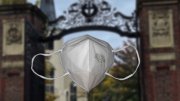During the week after Thanksgiving break, when Harvard’s campus was fully populated with students, professors, and staff, the University logged 140 cases of coronavirus; but during an early-January week with far fewer people present, 970 new infections were reported. So wrote Giang T. Nguyen, executive director of Harvard University Health Services (HUHS) in a community message on January 12. Although vaccination has, as expected, sharply reduced the risks of serious illness, hospitalization, or death—and the Harvard community was at last report 97 percent vaccinated—the University is preparing far-reaching steps to reduce the risks of transmission, which was at record levels throughout Massachusetts during January (with published rates of positive tests exceeding 20 percent). Thus, as the University prepares to resume in-person, on campus-instruction on January 24, it has taken several steps to combat the continuing pandemic.
The University
In an interview on December 16, just as exams were concluding and the winter break was about to begin, President Lawrence S. Bacow acknowledged, “Just when you think you can focus on something else, the virus rears its ugly head”—in the form of the highly transmissible Omicron variant of the coronavirus. In short order, the University:
• mandated vaccine boosters for the spring semester (with a January 31 date for completion);
• extended through April 1 coronavirus workplace policies in place since March 2020 (emergency excused absences, flexible use of sick time, dependent well care);
• on December 18, moved wintersession (January term) activities to remote operations, to effect a five-week break in campus density, to try to control the surge of infections; and
• on December 30, banned public spectators from athletic events scheduled through January 23.
On January 5, Faculty of Arts and Sciences (FAS) dean Claudine Gay posted a spring-term update, reiterating the commitment to on-campus operations as of January 24, but with enhanced precautions atop “Our layered approach to protecting the health and safety of our community—employing vaccination, high-quality masking, regular testing, improved filtration”—and now vaccine boosters. Among the additional steps she outlined:
• limiting indoor social gatherings, and requiring masking, for at least the first two weeks of the spring term, and prohibiting the serving of food at FAS gatherings;
• suspending sit-down dining service during the first two weeks of the term, and reverting to grab-and-go food service; and
• continuing to require instructors to be masked in classrooms (consideration was being given to relaxing the masking requirement for the spring term).
Despite these mitigation measures, Gay continued, “We anticipate that the number of Harvard community members who test positive for COVID-19 in late January will be greater than at any previous moment in the pandemic.”
Those strains on community resources, and the intersection of protection conferred by vaccination and the apparently less-dangerous nature of the Omicron variant to those who contract it, combine to yield other changes. As Nguyen wrote, “Individuals who test positive should identify and notify their close contacts,” as “HUHS will no longer be doing this due to high volume”: an end to the prior University contact-tracing and notification. Masking is to be upgraded to “high-quality…surgical-style” disposable masks,” or a KN-95 layered under a form-fitting fabric mask.
Undergraduate Life
The Dean of Students Office on January 13 notified undergraduates that as of January 14, those who test positive will now “isolate in place,” rather than separately—a change from the prior semester. If a direct roommate (someone who shares the same sleeping room) tests positive, students can apply for alternative housing, but such accommodations are “very limited,” and still will involve shared bathrooms and possibly bedrooms; such accommodations are limited to the length of time a direct roommate is in isolation. The alternative housing will come equipped with a bed, desk, and dresser only; students will be responsible for providing their own linens, moving themselves, and picking up meals from open dining halls. Alternative housing will be spartan: guests and gatherings are prohibited, and students in such accommodations must submit Harvard PCR tests daily—and return to their rooms or other locations (as the University prescribes) if they test positive. When such alternative housing is unavailable, students’ options include staying in their rooms and following HUHS guidance; reconfiguring their suites to separate sleeping areas; or “stay[ing] elsewhere off-campus if you can safely do so.”
As students who were off campus during the winter break prepare to return, they will undergo pre-arrival PCR virus testing, will find rapid antigen tests in their rooms, and then take an arrival PCR test and resume regular campus PCR testing.
In addition to grab-and-go dining, students are instructed, “Guidelines for reducing risk will be posted in shared bathrooms.” All users of shared facilities are encouraged to remain masked “unless showering, performing facial grooming, oral hygiene, or drinking.” Moreover, they are directed to “Limit use to one person at a time,” and to wait “at least a few minutes after the prior user has exited the bathroom.”
Steps like these, taken to reduce density and unmasked contact, reflect a shift in perspective: in a highly vaccinated and boosted community, Omicron infection may be far more pervasive, but less intensely threatening, than during earlier phases of the pandemic. The University remains vigilant; the pandemic continues; and “in-person” operations are still far from completely “normal” as daily life was understood on campus before March 2020.
Updated January 19, 2022, 9:05 a.m.: Yesterday, the University asked administrative staff members within the Central Administration who can work remotely to continue doing so through mid February—deferring the staff return to campus scheduled for January 24—in order to conserve coronavirus testing resources for students and faculty members who resume classes that date, and allowing time to monitor the rate of infections and take further mitigation steps as required. Individual schools are making their own decisions, based on their students’ and faculties’ needs.








